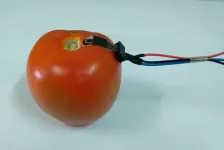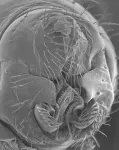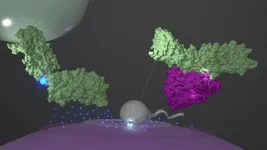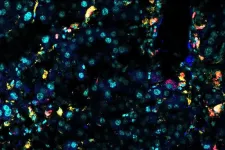(Press-News.org) Researchers at the University of São Paulo (USP) and the Federal University of Viçosa (UFV) in Brazil have developed a sustainable sensor that can be placed directly on the surface of a vegetable or fruit to detect the presence of pesticides. Known for this reason as “plant-wearable”, it is made of cellulose acetate, a material derived from wood pulp.
The device has the potential to help assure food safety in a world that increasingly suffers from a shortage of food and the environmental and health problems caused by excessive use of agrochemicals.
An article describing the results of the study is published in the journal Biomaterials Advances.
Pesticides are widely used to raise crop yields and are typically applied by spraying, but only 50% reach their target. The rest ends up in soil, groundwater, surface water, raw drinking water, wastewater and food products. Monitoring of pesticide levels in water, soil and food is therefore essential to prevent contact between these toxic substances and the public via the skin, lungs or digestive system.
The analytical tools most often used for this purpose are chromatographic techniques, which are effective but have drawbacks such as the need for pretreatment of samples, expensive equipment and qualified laboratory specialists, as well as the long time taken to complete the analysis and lack of portability. The unsafe residues produced by organic solvents are also a significant problem under present-day conditions.
“As an alternative, electrochemical sensors can combine affordability, rapid detection, miniaturization, large-scale production, convenience, ease of use, high selectivity and in situ pesticide detection. Our invention has all these features. The analysis is performed directly on the surface of fruit, vegetables or leaves. Hence the term plant-wearable,” said Paulo Augusto Raymundo-Pereira, last author of the article and a researcher at the São Carlos Physics Institute (IFSC-USP).
“However, instead of the usual materials, which are environmentally unsustainable and take a long time to degrade, such as ceramics or plastic polymers derived from petroleum, we used cellulose acetate, a material derived from plants that has little impact on the environment and disintegrates completely in 340 days or less depending on local conditions. Of course, it has to have appropriate characteristics for any sensor, including low cost, portability and flexibility.”
The biodegradable cellulose acetate substrate was produced by a casting method in which the material was placed in a space with the required shape, and the full electrochemical system with three electrodes was deposited by screen printing.
The researchers carried out laboratory tests in which a solution containing carbendazim, a fungicide, and paraquat, a herbicide, was sprayed on lettuce and tomatoes in a simulation of real-world use. Paraquat was banned by the European Union in 2003 owing to its harmful effects on humans but is still used in Brazil. The sensor was then directly attached to the lettuce and tomatoes, and measurements showed a level of detection compatible with those obtained with polyethylene terephthalate, the sensor material most frequently used for this purpose.
Excessive pesticide levels
The study, which was funded by FAPESP (projects 20/09587-8, 23/07686-7, 16/01919-6, 22/02164-0 and 23/09685-8) also investigated whether washing and immersing vegetables in a liter of water for two hours was effective to remove pesticide residues. The results showed removal of 40% of the carbendazim and 60% of the paraquat from lettuce, and 64% of both from tomatoes.
“Washing and immersion were clearly insufficient to remove residues of the pesticides. At least 10% remained in the leaves or peel,” Raymundo-Pereira said.
The technology can be useful for sanitary surveillance agencies worldwide, he added, as well as sellers of organic produce to certify absence of pesticides. Farmers generally can use it to monitor levels of pesticides in the field and be sure of applying only the requisite dose to each crop or part of a plantation. Pesticide use could decrease as a result, while yields will still rise, leading to lower consumer prices.
Besides the IFSC-USP team, the following researchers also took part in the study: Samiris C. Teixeira, Nilda de F. F. Soares and Taíla V. de Oliveira at UFV; and Nathalia O. Gomes, Marcelo L. Calegaro and Sergio A. S. Machado at the São Carlos Chemistry Institute (IQSC-USP).
About São Paulo Research Foundation (FAPESP)
The São Paulo Research Foundation (FAPESP) is a public institution with the mission of supporting scientific research in all fields of knowledge by awarding scholarships, fellowships and grants to investigators linked with higher education and research institutions in the State of São Paulo, Brazil. FAPESP is aware that the very best research can only be done by working with the best researchers internationally. Therefore, it has established partnerships with funding agencies, higher education, private companies, and research organizations in other countries known for the quality of their research and has been encouraging scientists funded by its grants to further develop their international collaboration. You can learn more about FAPESP at www.fapesp.br/en and visit FAPESP news agency at www.agencia.fapesp.br/en to keep updated with the latest scientific breakthroughs FAPESP helps achieve through its many programs, awards and research centers. You may also subscribe to FAPESP news agency at http://agencia.fapesp.br/subscribe.
END
Biodegradable sensor monitors levels of pesticides via direct contact with surface of fruit and vegetables
Developed by a team of Brazilian researchers, the device is made of plant-based material with little environmental impact, and detects pesticides in a few minutes, helping to certify food safety
2024-02-02
ELSE PRESS RELEASES FROM THIS DATE:
Paper: Multistate foodborne illness outbreaks impact restaurant stock price, public perception
2024-02-02
CHAMPAIGN, Ill. — As demand for food from restaurants soars in the U.S., so does the importance in understanding the impacts of foodborne illness outbreaks. A new paper co-written by a University of Illinois Urbana-Champaign expert in food marketing and food policy finds that outbreaks spanning multiple states bring swift financial losses, increased media attention and a public-relations hit that makes smaller outbreaks more financially damaging.
In the U.S., more than 60% of foodborne illness outbreaks occur at restaurants, and the vast majority of those outbreaks are confined ...
Identifying genomics markers to predict radiation sensitivity
2024-02-02
As the effectiveness of radiotherapy varies greatly between tumours, finding gene signatures to predict the radiation response could better guide the clinicians to personalize treatment plans. Professor Venkata Manem, affiliated with the Faculty of Medicine at Université Laval and the Centre de recherche CHU de Québec - Université Laval, has made a promising step to advance pre-clinical research in the field of precision radiation oncology.
Currently, doctors use a “one-size-fits-all” paradigm for radiotherapy, with a given dose and frequency ...
Turban style and thickness affects head injury risk in Sikh cyclists
2024-02-02
Sudden impacts or jolts to the head can cause skull fractures and traumatic brain injuries (TBIs). TBIs can cause bleeding, unconsciousness, and potential changes to the brain leading to memory loss, mood and personality changes and lack of concentration - sometimes many years after the initial injury.
However, very little research has been done to ascertain the extent and mechanism by which turbans might mitigate impacts to the head during cycling incidents.
Now, researchers from Imperial and the Sikh Scientists Network have studied the performance of turban styles ...
Scientists successfully simulate protein complex that initiates fertilization
2024-02-02
Who hasn't seen it before: the view through the microscope in which a sperm penetrates an egg cell and fertilises it. This fundamental step in procreation happens dynamically and seemingly without problems. However, if you zoom in on the processes that take place during fertilisation at a molecular level, it becomes highly complex and it is thus not surprising that 15 percent of couples worldwide struggle to conceive. No microscope, however modern, can illuminate the countless interactions between the proteins involved. Therefore, the exact trigger for the fertilisation process and the molecular events that transpire just before the fusion of the sperm and egg have ...
Immune cells lose ‘killer instinct’ in cancerous tumors – but functionality can be re-awakened
2024-02-02
Some immune cells in our bodies see their ‘killer instinct’ restricted after entering solid tumours, according to new research.
In a new paper published in Nature Communications, a team led by researchers from the University of Birmingham and the University of Cambridge found how immune cells called natural killer cells (NK cells) rapidly lose their functionality when entering and residing in tumours.
Using tumour cells grown from mice models, the team established that NK cells adopt a dormant state when entering solid tumours through the loss of production of key effector mechanisms used to promote immune ...
Did climate change trigger pandemics in antiquity?
2024-02-02
For their study in Science Advances, the researchers reconstructed temperatures and precipitation for the period from 200 BC to 600 AD, with a resolution of three years. This means that two data points cover a period of three years – an extremely high resolution for paleoclimate researchers. The period extends from the so-called Roman Climatic Optimum to the Late Antique Little Ice Age. This period also includes three major pandemics known from historians’ records: the Antonine Plague (around 165 to 180 AD), the Cyprian Plague (around 251 to 266) and the Justinian ...
Outstanding success in the Excellence Strategy: TU Dresden enters the next round with three new Clusters of Excellence initiatives
2024-02-02
As a result, TUD ranks second overall in the number of calls for proposals in the current competition nationwide. This is according to today’s joint announcement (February 2, 2024) by the German Research Foundation (DFG) and the German Science and Humanities Council (WR). An international panel of experts appointed by the DFG and the WR through the Joint Science Conference (GWK) has assessed a total of 143 draft proposals over the last few days and selected 41 as valuable funding opportunities.
In addition, TUD's three existing Clusters of Excellence have expressed their intent to the DFG that they wish to continue their outstanding research work. TUD, therefore, ...
HMSOM researchers: Data shows clinical trials becoming more inclusive
2024-02-02
Clinical trials and medical research have been historically lacking in diversity among all groups.
But recent trends have been turning the tide at least a little bit toward equity and inclusivity, according to a new meta-analysis published by a team of investigators from the Hackensack Meridian School of Medicine (HMSOM) and the Hackensack Meridian Health Research Institute (HMHRI).
The meta-analysis of clinical trials which included New Jersey patients from 2017 to 2022 show a snapshot of more diverse representation - and better reporting of race and ethnicity factors, according to the new paper in the Elsevier ...
CAR T cells show promise against age-related diseases in mice
2024-02-02
Highlights
Laboratory research led by MSK and Cold Spring Harbor Laboratory demonstrates the potential for CAR T cells to improve “healthspan” by eliminating senescent cells associated with aging-related diseases.
Not only was the treatment able to improve the metabolic function of aging mice and mice fed a high-fat diet, but it also proved protective against metabolic decline when given to younger mice.
The CAR T cell-based approach offers a powerful alternative to more traditional small-molecule drugs target senescent cells, supported by its long-lasting effects and the potential to fine-tune ...
Clinique partners with Icahn School of Medicine at Mount Sinai to establish the Mount Sinai-Clinique Healthy Skin Dermatology Center
2024-02-02
New York, NY (February 2, 2024) – Clinique and Icahn School of Medicine at Mount Sinai today announced a philanthropic partnership to establish the Mount Sinai-Clinique Healthy Skin Dermatology Center. The Center will develop forward-thinking research in dermatology, exploring the biological underpinnings of how skin ages, skin allergies and inflammatory or eczematous skin conditions, including eczema (or atopic dermatitis) and contact dermatitis. Rooted in a shared mission to conduct dermatological research that improves patients’ lives, the partnership will focus on applicable scientific discovery and leading-edge innovation to modernize allergy science in order to ...
LAST 30 PRESS RELEASES:
A promising potential therapeutic strategy for Rett syndrome
How time changes impact public sentiment in the U.S.
Analysis of charred food in pot reveals that prehistoric Europeans had surprisingly complex cuisines
As a whole, LGB+ workers in the NHS do not experience pay gaps compared to their heterosexual colleagues
How cocaine rewires the brain to drive relapse
Mosquito monitoring through sound - implications for AI species recognition
UCLA researchers engineer CAR-T cells to target hard-to-treat solid tumors
New study reveals asynchronous land–ocean responses to ancient ocean anoxia
Ctenophore research points to earlier origins of brain-like structures
Tibet ASγ experiment sheds new light on cosmic rays acceleration and propagation in Milky Way
AI-based liquid biopsy may detect liver fibrosis, cirrhosis and chronic disease signals
Hope for Rett syndrome: New research may unlock treatment pathway for rare disorder with no cure
How some skills become second nature
SFU study sheds light on clotting risks for female astronauts
UC Irvine chemists shed light on how age-related cataracts may begin
Machine learning reveals Raman signatures of liquid-like ion conduction in solid electrolytes
Children’s Hospital of Philadelphia researchers emphasize benefits and risks of generative AI at different stages of childhood development
Why conversation is more like a dance than an exchange of words
With Evo 2, AI can model and design the genetic code for all domains of life
Discovery of why only some early tumors survive could help catch and treat cancer at very earliest stages
Study reveals how gut bacteria and diet can reprogram fat to burn more energy
Mayo Clinic researchers link Parkinson's-related protein to faster Alzheimer's progression in women
Trends in metabolic and bariatric surgery use during the GLP-1 receptor agonist era
Loneliness, anxiety symptoms, depressive symptoms, and suicidal ideation in the all of us dataset
A decision-support system to personalize antidepressant treatment in major depressive disorder
Thunderstorms don’t just appear out of thin air - scientists' key finding to improve forecasting
Automated CT scan analysis could fast-track clinical assessments
New UNC Charlotte study reveals how just three molecules can launch gene-silencing condensates, organizing the epigenome and controlling stem cell differentiation
Oldest known bony fish fossils uncover early vertebrate evolution
High‑performance all‑solid‑state magnesium-air rechargeable battery enabled by metal-free nanoporous graphene
[Press-News.org] Biodegradable sensor monitors levels of pesticides via direct contact with surface of fruit and vegetablesDeveloped by a team of Brazilian researchers, the device is made of plant-based material with little environmental impact, and detects pesticides in a few minutes, helping to certify food safety








